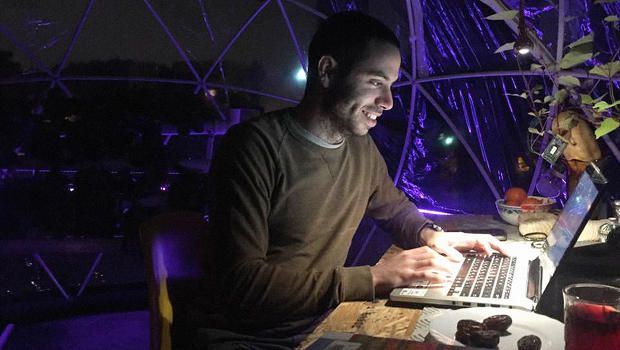The Mars Farm Odyssey group is thinking of non-NASA-approved solutions for making sure our colonists on the red planet have food (and weed).



NASA needs to get out of the rocket business and start doing what it’s uniquely qualified for.

NASA researchers have a lot of problems to work through if they want astronauts to one day set foot on Mars. One of the biggest hurdles is where these early pioneers will sleep and live, and after a day of brainstorming, engineers might have come up with a solution – a conceptual ‘ice home’ design.
Yup, NASA is looking into creating inflatable domes covered in ice for astronauts to live and work in, providing them with protection from extreme temperatures and high-energy radiation.
“After a day dedicated to identifying needs, goals, and constraints we rapidly assessed many crazy, out of the box ideas and finally converged on the current Ice Home design, which provides a sound engineering solution,” said senior systems engineer Kevin Vipavetz, from NASA’s Langley Research Centre in Virginia.

They certainly are off to a great start with the QC satellite communications and their net infrastructure. So, could China indeed dominate AI as the leader of the most advance AI in the world? Maybe as they are on a great start to do so.
After a year of breakthroughs, experts believe they are on the brink of revolutionising our daily lives through artificial intelligence – and Asia can play a leading role in this brave new world.

As humans explore other worlds, the colonies they develop may change over time. While the first settlements may rely on individuals, as the outposts grow more self-sustaining, families will likely become the colonists of choice, a panel of experts said.
“The socioeconomic origins of colonists are going to change over time,” science fiction author Charles E. Gannon told Space.com.
Earlier this year at Dragon Con in Atlanta, Gannon was part a panel of scientists and science communicators who discussed how future space colonies might look and act, and how such developments might affect the rest of humanity on Earth. Gannon was joined by nuclear physicist Ben Davis, forensic anthropologist Emily Finke, science teacher Lali DeRosier and moderator Kishore Hari, a self-described “professional nerd.” [NASA’s Wild Space Colony Concepts in Images].

Some end of year thoughts on what we can hope to expect over the next few decades in terms of pushing the envelope of space travel.
Thoughts on a few benchmark dates for pushing humanity offworld and beyond the solar system. Here are few estimates for when we should expect future milestones in our crewed voyages beyond low-Earth orbit and to Proxima Centauri b.



By 2018, China plans to land on the dark side of the moon; within 3 years Mars. Last year, we learned that China has interests in mining raw materials from the Moon particularly from the dark side of the moon. Also, researchers have discovered some very resilient raw materials for things such as concrete on Mars. SO, could we see in the next 5 years mining by China on Mars?
“To explore the vast cosmos, develop the space industry and build China into a space power is a dream we pursue unremittingly,” read a white paper setting out the country’s space strategy for the next five years. It says China aims to use space for peaceful purposes and to guarantee national security, and to carry out cutting-edge scientific research.
The white paper, released by the information office of China’s Cabinet, points to the growing ambitions of China’s already rapidly advancing space program. China places great emphasis on the development of its space industry, seen as a symbol of national prestige that will raise the country’s standing in the world. Although the white paper doesn’t mention it, China’s eventual goal is to land an astronaut on the moon.
While Russia and the United States have more experience in manned space travel, China’s military-backed program has made steady progress in a comparatively short time.

Hmmm.
Technological and human rights implications for the world
China adopted the highly controversial cyber security law on 7th November 2016. The legislation which will take effect in June 2017 was passed by its largely rubber – stamp parliament emphasizing the ‘objective need’ of China as a major internet power. The stated objective of the law is to counter the growing threats such as hacking and terrorism. Overseas critics of the law are not amused as it has already triggered concerns among foreign business and rights groups that the law threatens to shut foreign technology companies out of various sectors which China deems as ‘critical’. The legislation also incorporates contentious requirements for security reviews and for data to be stored on servers in China.
China recognizes that cyberspace profoundly impacts many aspects of national security; it is a national space; a space for military action, important economic action, criminal action and for espionage. So it controls Internet through the world’s most sophisticated online censorship mechanism infamously known outside China as the Great Firewall. The human rights advocates contend that the law will further tighten restrictions on Internet which is already stifled by highly regulated governmental control. The legislation was in drawing board stage for long. Beijing released the draft Cyber Security Law in July 2015 to make all key network infrastructure and information systems ‘secure and controllable’.